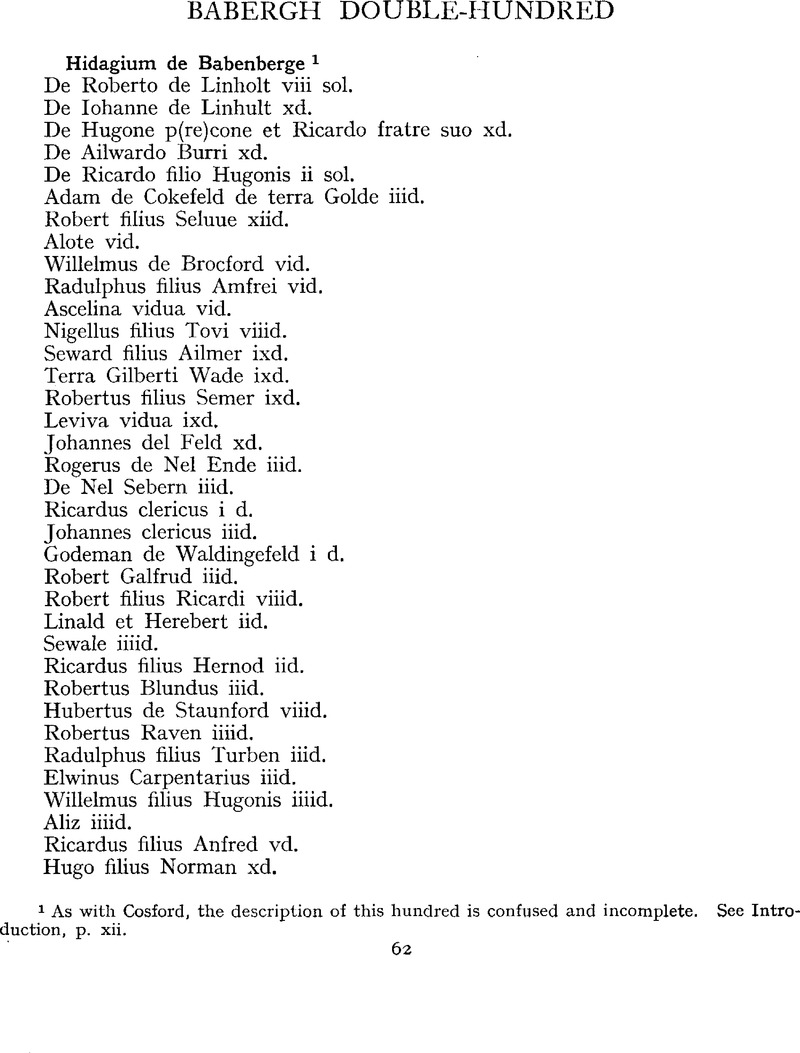No CrossRef data available.
Published online by Cambridge University Press: 24 December 2009

page 62 note 1 As with Cosford, the description of this hundred is confused and incomplete. See Introduction, p. xii.
page 65 note 1 The ferderings, their geld assessment and their Domesday tenants are discussed fully in the Introduction, pp. xxi ff.
page 66 note 1 Infra, p. 70, this 4s. is described as paid for renewal of frankpledge.
page 66 note 1 This is Robert of Cockfield. He is mentioned here, although dead, because Abbot Samson claimed that this land, being held on lease (ad firniam), was not hereditary. See the note by William of Diss in Jocelin, p. 139. His son and heir, Adam, figures supra, p. 62, and infra, pp. 67, 70.
page 67 note 1 Sudbury itself was assessed in Thingoe Hundred. Lavenham seems also to figure as Lafham in Cosford Hundred. See p. 59, n. 4, above.
page 68 note 1 Land in Pokeham was confirmed to Richard son of William in 1199. See Charter 94. Pokeham is in the parish of Cornard.
page 68 note 2 A quarter of a hundred and not just a ferdering. See Introduction, p. xxix.
page 68 note 3 The list is incomplete and duplicates both a previous section (supra, p. 65) and the following section, infra, p. 60, while contradicting the statement that ‘ we cannot yet know how much the reeves used to take for these suits ’ (infra, p. 70).
page 70 note 1 Just as the hundred-suits in other villages were obligations on particular tenements, so also in the bishop of Ely's manor of Hartest the obligation fell on one tenement. It consisted of 30 acres and seems to have been socage land since it paid a rent of 32d., the normal rate for sokemen paying hidage. In 1222 this tenement was held by Gilbert Forest who owed ‘ sectum comitatus et hundredi et si forsitan villata inciderit per defaltam suam, ipse adquietabit misericordiam ’ (Brit. Mus., MS. Cotton, Tiberius B. ii, fo. 194r). In 1251 we find that the suit was owed twice a year, ‘ et etiam quotiens opus fuit per annum pro afforciamento curie vel pro brevi domini regis ’ (Douglas, Social Structure, p. 137).
page 70 note 2 I.e. de Vere, earl of Oxford.
page 70 note 3 Contrast the incomplete list given supra, p. 68.
page 70 note 4 Supra, p. 66.
page 70 note 5 Since the total of sheriff's aid in Babergh amounted to £3 15s. 1d., it follows that the sheriff himself only received £1 15s. id. of the ‘ sheriff's aid ’.
page 71 note 1 This passage makes it clear that Babergh had previously been ‘ farmed out ’ for an annual rent of one hundred shillings. The calculations as to how it will render more if administered by the abbot's own agents can be seen at a glance in the table given in the Introduction, p. xxxiv.
page 71 note 2 A mistake for Pokeham ? Pakenham is in Thedwardestry.
page 71 note 3 The passage that follows is from the Final Concord between Abbot Samson and Adam of Cockfield (dated 29 Nov. 1191), printed is the Pipe Roll Series, vol. xvii, no. 10. It is in the form of an addendum and corrigendum to the survey. See Introduction, p. xiii.
page 71 note 4 Supra, p. 60. Siward of Lafham.
page 71 note 5 Supra, p. 59. Wibolt de Lafham.
page 71 note 6 Supra, p. 59. Brunloc de Lafham.
page 71 note 7 Supra, p. 60. I.e. Terra Duggel.
page 71 note 8 Supra, p. 59. Aldeth Fin there had only half this amount.
page 70 note 9 He has half this amount, supra, p. 60.